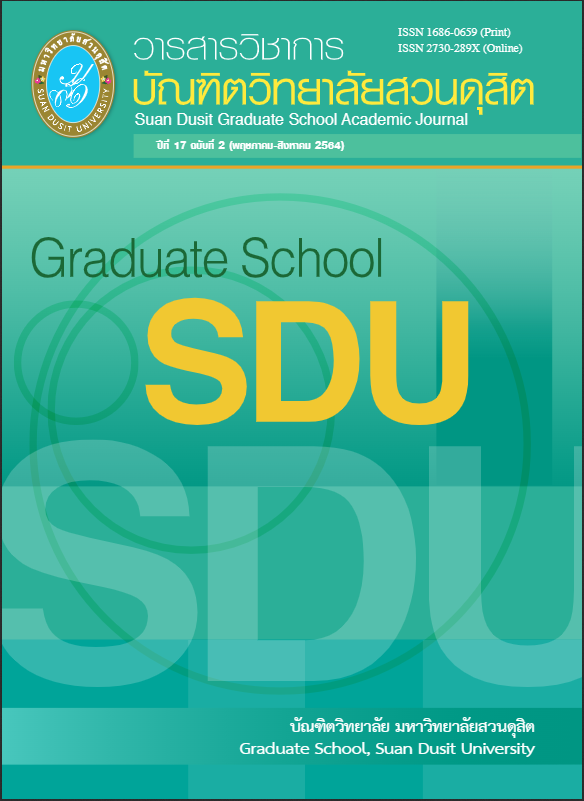Promotion of Organic Agricultural Products: Consumers' Cognition, Attitude, and Perspective towards Marketing Factors
Keywords:
Agriculture, Organic Farming, Organic Agricultural Products, Marketing of Organic Agricultural ProductsAbstract
The aims of this research were (1) to survey the cognition, attitudes, and opinion towards market factors of organic agricultural products from the view of consumers, and (2) to provide recommendations in promoting organic agricultural products to satisfy consumers' requirement. The data were collected by using questionnaire with the samples recruited by purposive sampling method from those who were buying or bought organic agricultural products at department stores and markets. The total of 1,182 samples were selected from 12 provinces of 5 regions. The cognition of consumers was evaluated by questionnaire of which choices consisted of correctly understood, misunderstood, and not sure answers and analyzed in terms of frequency and percentage. The attitudes and market factors towards organic agricultural products were collected by rating scale questionnaire and analyzed in terms of mean and standard deviation. It was found that there was misunderstanding of the consumers due to the lack of communication about the organic agriculture standard. Most consumers held positive attitude towards health care and were willing to consume non-toxic products, certified by a reliable authority, but not necessary to be organic products. They also looked for quality and variety of products with low price and accessibility. Consequently, the related public and private agencies should promote understanding of the consumers, promote cultivators to produce diverse organic agricultural products with cost-control measure, as well as promote the expansion of organic products entrepreneurs to align with the market demand.
References
กรมวิชาการเกษตร. (2555). มาตรฐานสินค้าเกษตร มกษ. 9000 เล่ม 1-2552. กรุงเทพฯ: สำนักพัฒนาระบบและรับรองมาตรฐานสินค้าพืช กรมวิชาการเกษตร กระทรวงเกษตรและสหกรณ์
กรีนเนท. (2557). สถานการณ์เกษตรอินทรีย์ไทย. [Online]. Available: http://www.greennet.or.th/article/organic-farming. [2558, มกราคม 3].
ณัชชา ลูกรักษ์, ดุสิต อธินุวัฒน์ และธีระ สินเดชารักษ์. (2556). ปัญหาและอุปสรรคในการปรับเปลี่ยนเพื่อการผลิตพืชผักอินทรีย์ของเกษตรกรจังหวัดราชบุรีที่ผ่านการอบรมโครงการพัฒนาระบบเกษตรอินทรีย์. Thai Journal of Science and Technology, 2 (2): 125-133.
ปกฉัตร ชูติวิศุทธิ์ (2562). เกษตรอินทรีย์ วิถียโสธร...แนวทางการเกษตรจากเมืองเกษตรอินทรีย์ต้นแบบของประเทศไทย. วารสารสิ่งแวดล้อม, 23 (2): 1-13.
วริพัสย์ เจียมปัญญารัช. (2560). ปัจจัยที่ส่งผลต่อความยั่งยืนของเกษตรกรอินทรีย์ของไทย: บทเรียนจากเกษตรกรรายย่อย, วารสารสังคมศาสตร์ มหาวิทยาลัยศรีนครินทรวิโรฒ, 20: 199-215.
ศูนย์วิจัยกสิกรไทย. (2561). ตลาดออร์แกนิค ธุรกิจสร้างเงิน SME ไทย, กรุงเทพฯ: ศูนย์วิจัยกสิกรไทย ธนาคารกสิกรไทย.
สมเกียรติ วงศ์ประเสริฐ และวิลาวรรณ์ เชื้อบุญ. (2561). ทัศนคติต่อสินค้าอาหารอินทรีย์ของผู้บริโภค ในเขตกรุงเทพมหานคร. Thai Journal of Science and Technology, 7 (4): 399-407.
สำนักงานมาตรฐานสินค้าเกษตรและอาหารแห่งชาติ (มกอช.). (2552). มาตรฐานและข้อกำหนดสำหรับหน่วยรับรองตามมาตรฐาน IFOAM, JAS, และ NOP. กรุงเทพฯ: สำนักงานมาตรฐานสินค้าเกษตรและอาหารแห่งชาติ.
สำนักงานสถิติแห่งชาติ. (2562). สถิติรายได้และรายจ่ายครัวเรือน. [Online]. Available: http://statbbi.nso.go.th/staticreport/page/sector/th/08.aspx. [2562, มิถุนายน 10].
สุณัฐวีย์ น้อยโสภา. (2558). "เกษตรอินทรีย์" โอกาสการส่งออกของเกษตรกรไทยในตลาดโลก. วารสารวิชาการมหาวิทยาลัยธนบุรี, 9 (18): 83-91.
อภิชาต ใจอารีย์. (2561). แนวทางการขับเคลื่อนเกษตรอินทรีย์เพื่อสร้างความมั่นคงด้านอาหารปลอดภัยสำหรับชุมชน: บทสะท้อนจากภาคปฏิบัติ. วารสารมหาวิทยาลัยศิลปากร, 38 (5): 1-17.
Assael, H. (1995). Consumer Behavior and Marketing Action (5th ed.). U.S.A.: International Thomson.
Belch, G. E. & Belch, M. A. (2007). Advertising and Promotion: An Integrated Marketing Communications Perspective. Boston, MA: Graw-Hill Irwin.
Best, J. & Kahn, J. V. (1993). Research in Education. Boston: Allyn and Bacon.
Cronbach, L. J. (1951). Coefficient Alpha and the Internal Structure of Tests. Psychometrika, 16 (3): 297-334.
Cochran, W. G. (1953). Sampling Techniques. New York: Experimental Designs.
Kotler, P. (2011). Marketing Management: Analysis Planning Implementation and Control. New Jersey: Prentice Hall International, Inc.
Lemon, K. & Verhoef, P. (2016). Understanding Customer Experience Throughout the Customer Journey. Journal of Marketing: AMA/MSI Special Issue, 80: 69-96.
Lernoud, J. & Willer, H. (2019). Organic Agriculture Worldwide: Key Results from the FiBL Survey on Organic Agriculture Worldwide 2019. Switzerland: Research Institute of Organic Agriculture.
Pornpratansombat, P., Bauer, B. & Boland, H. (2011). The Adoption of Organic Rice Farming in Northeastern Thailand. Journal of Organic Systems, 6 (3): 4-12.
Schiffman, L. G. & Kanuk, L. L. (2007). Consumer Behavior (9th ed.). New Jersey: Prentice Hall International, Inc.
Vivek, S. D., Beatty, S. E. & Morgan, R. M. (2012). Customer Engagement: Exploring Customer Relationships Beyond Purchase. Journal of Marketing Theory and Practice, 20 (2): 122-146.
Downloads
Published
How to Cite
Issue
Section
License
Copyright (c) 2021 Suan Dusit Graduate School Acadamic Journal

This work is licensed under a Creative Commons Attribution-NonCommercial-NoDerivatives 4.0 International License.






